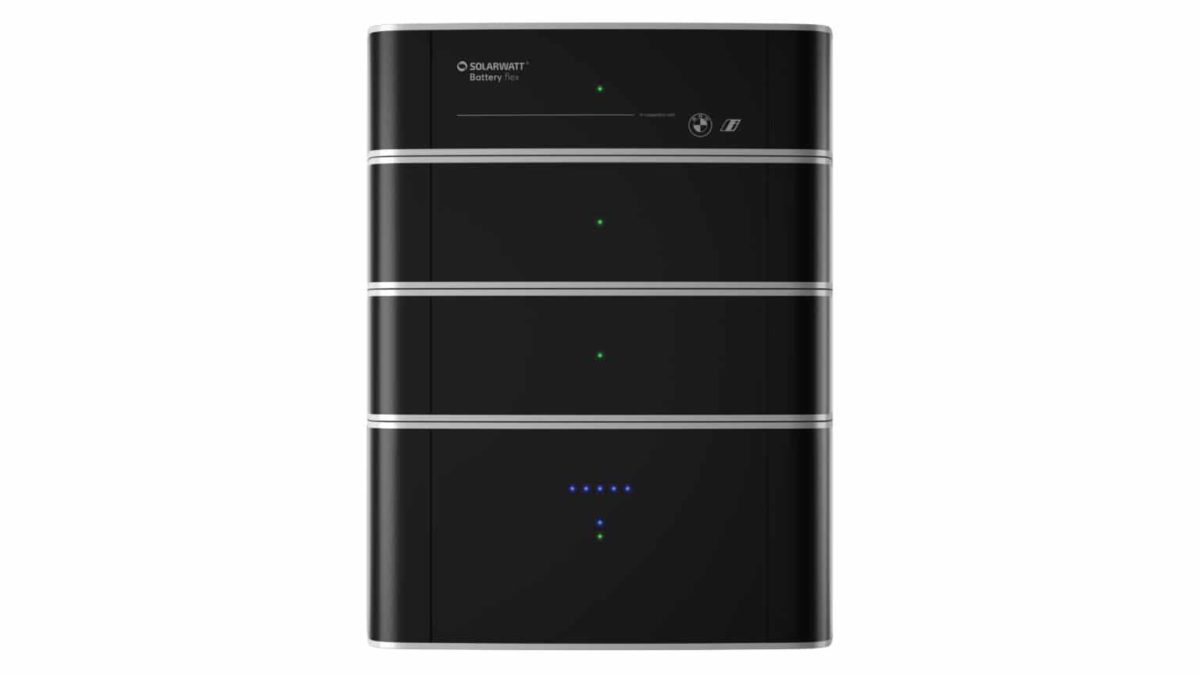From pv magazine Germany
After two years of development, German solar module and battery manufacturer Solarwatt has unveiled its residential storage system – the Battery flex AC-1. With this move, the company phased out its My Reserve series after many years and began, again, cooperation with German car manufacturer BMW, which has been the main shareholder in Solarwatt for several years.
The new battery will be available from autumn, initially as a single-phase, AC-coupled device. Two more variants are to follow next year, one for coupling to a hybrid inverter, and a complete solution with an integrated hybrid inverter. The DC solution previously developed by Solarwatt is initially not part of the planned Battery flex portfolio. However, Solarwatt leaves open the option of integrating this topology into the product family at a later date.
All three storage products included in the new series should look the same. They consist of a basic electronic module on which several battery modules – each with a usable capacity of 2.4 kWh – can be stacked, and which ends with a top battery module. The power unit can later be ordered as a suitable hybrid or battery inverter, or for coupling to a hybrid inverter.
During a demonstration by Olaf Wollersheim, managing director of Solarwatt, stacking and connecting the 25kg battery modules only took a few seconds because the connections on the top and bottom were very easy to perform. Before doing this, however, it is necessary to assemble the wall bracket and to put the electronics module into operation. Each battery module comes with a piece of the wall bracket in the package, which is then also connected as a plug-in system to a fixed column. The column has a rail profile in which the battery modules are hung and can be lowered. The electronics module is located on the floor and its cover can be removed. The connection cables for the connection to the power grid, the internet and the current sensor, are plugged in there.
In addition to the controller area network (CAN bus) connection, there is also an RS485 interface for hybrid inverters. The list of compatible hybrid inverters will probably only be available when the hybrid version is released. With the interface, several systems can also be parallelized as a cluster, explained Wollersheim. This could be used, for example, to operate several of the single-phase AC systems on different phases in parallel. The entire battery tower can be mounted either hanging it on the wall or standing on the floor.
The aluminum housing is matte black and hides handles and buttons behind flaps. In addition to the modularity and appearance, there is another aspect that might be of interest to customers. Together with BMW, Solarwatt will form a purchasing community for the components of the cell modules, which will then be assembled into battery modules in its own plant in Dresden, explained Wollersheim. He announced that BMW would ensure low purchase prices. At the same time, quality assurance should adapt to the automotive standard. BMW has made it its business to make the supply chain, from the minerals to the end product, traceable. According to its own statement, it does not use cobalt from the Democratic Republic of the Congo.
The smallest of the storage units has a capacity of 4.8 kWh and an output of 1.5 kW. It can be expanded to eight battery modules in steps of 2.4 kWh and has a maximum of 57.6 kWh and 6 kW of power. The system consumption in standby mode, AC & DC, when discharged, is specified as 25 W. Furthermore, heat pumps can be integrated.
The guarantee is for 10 years with a remaining capacity of 80% and Solarwatt will provide full replacement in the event of malfunction. The emergency power supply can later be retrofitted as a function, with an additional switch box.
This content is protected by copyright and may not be reused. If you want to cooperate with us and would like to reuse some of our content, please contact: editors@pv-magazine.com.



An excellent solution that will serve many consumers in the world. Combination with hybrid systems for generating electricity and hot water will lead to a declaration of OFF-GRID systems.